With a growing middle class, early-stage frontier markets, enormous demographic advantages, and its ongoing digital transformation, Africa continues to grow in both economic and geopolitical importance. In “Demystifying Africa’s Risk Perception Premium,” Paul Clyde and co-authors make the case for a stronger U.S.- Africa trade and investment relationship, one that changes the narrative around doing business on the continent.
Small and medium-sized enterprises (SMEs) are vital engines of growth and employment, particularly in low- and middle-income countries (LMICs). Research has shown that gender-inclusive practices can enhance both financial and social outcomes for these businesses.
WDI, in collaboration with DAI and MarketShare Associates (MSA) through USAID’s Feed the Future Market Systems and Partnerships (MSP) Activity, conducted a series of case studies highlighting how SMEs can achieve “profit with purpose” through women-inclusive business models and operations. WDI’s key role on this project was to calculate the women-inclusive return on investment which included working closely with companies to collect and collate data.
This collection of resources answers the call of the Women-Inclusive Return on Investment Investment (WI-ROI) framework to build the evidence base of ROIs from SMEs in LMICs. The case studies also provide detailed information on how the ROI was calculated to help inform those interested in calculating their own WI-ROI. The learning note and synthesis report offer guidance on selecting and vetting companies, measuring the WI-ROI, and scaling women-inclusive strategies.
These resources aim to equip SMEs with the knowledge and tools needed to implement women-inclusive practices, measure their impact and WI-ROI, and ultimately drive business growth while contributing to gender equality. The team also held a webinar in April 2024 introducing these resources and answering audience questions on the WI-ROI.
We’d love to hear your feedback or answer any questions about these resources; please contact us at WDI-PerformanceMeasurement@umich.edu
This project is designed to extend the business of an Ethiopian company providing imaging services in Ethiopia to Uganda. The initial work has involved market analysis and working with the different parties on governance recommendations.
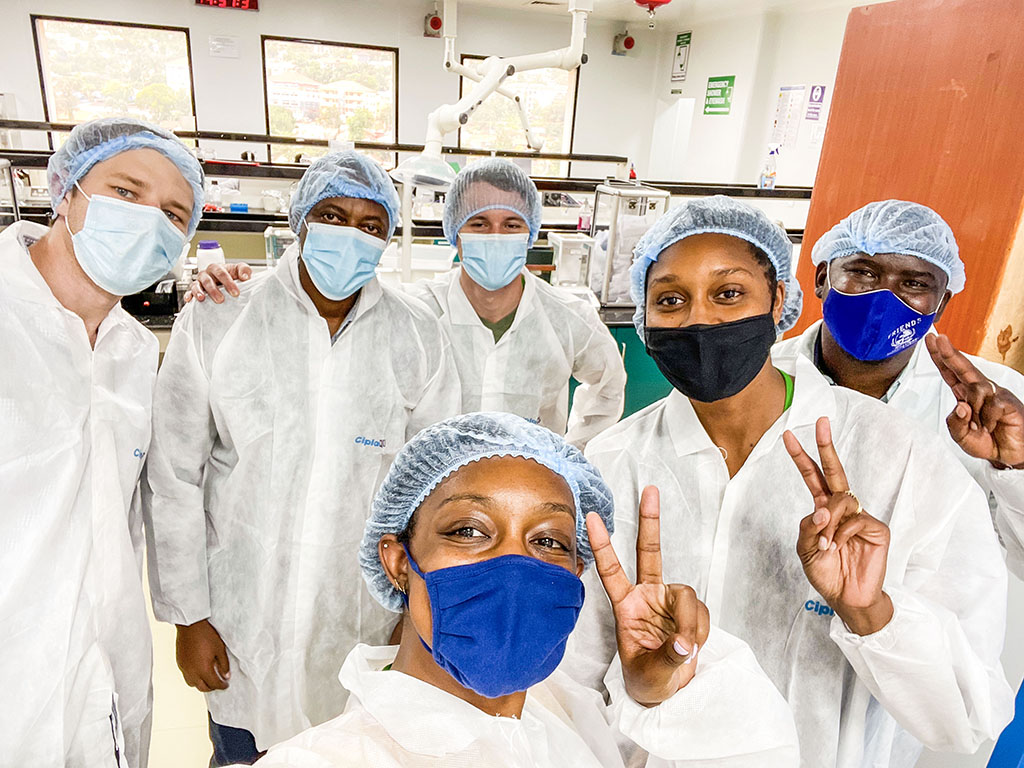
U-M Business students explore a laboratory as part of a WDI-sponsored project in Uganda with partner Busoga Health Forum (BHF). BHF’s goal is improving health in the Busoga region by developing new services and products. The U-M team provided a market assessment and recommendations for developing a diabetes product.
When faced with the task of choosing her MBA project, Alexis Kenworthy, a dual-degree graduate student, knew she could rely on the William Davidson Institute (WDI). She’d already connected with the Institute to work on the International Investment Fund project, and she’d been prioritizing international work since before her time at the University of Michigan’s Ross School of Business.
“WDI provides opportunities that I didn’t see exist in the traditional classroom setting. Business is becoming so international, and WDI is on the forefront of that,” said Kenworthy, who participated in two WDI-sponsored projects.
As Kenworthy noted, substantial real-world experiences elevate a business education, and each year students at the University of Michigan’s Ross School of Business integrate these critical pieces of the academic puzzle. MBA students are asked to complete Multidisciplinary Action Projects (MAPs) in their first year, internships between their first and second years, and practical courses founded in action-based learning. Students looking to make an international impact through these requirements needn’t look far. WDI has supported global connections for more than 1,700 students through internships, courses and MAPs, in more than 60 countries since the Institute was founded thirty years ago. And this year was no different.
Twenty graduate students pursuing their MBA at Ross participated in WDI-supported MAPs in 2022, helping advance the work of WDI partner organizations in Ghana, India, Uganda and Ukraine (virtually).
WDI offers projects, internships, and coursework that bridge academia and business — and a dedicated group of students who have completed at least two of these opportunities and demonstrated a commitment to addressing business challenges in low- and middle-income countries can attain a special designation: Davidson Field Scholars.
This select group of U-M graduate students actively engage with WDI and commit themselves to working with international partner organizations. For the 2021-2022 academic year WDI hosted five graduate students as scholars.
Kenworthy signed up and dug into her project — one that eventually allowed her to become a Davidson Field Scholar. In 2021, Kenworthy worked with a team of students to consult Private Equity Support, an organization in Kenya that assists small businesses in gaining seed funding, in boosting business efficiencies. She and her team analyzed organizational processes to find ways to streamline resources and improve reach. After working closely with the business, the team made recommendations on adopting automated procedures, eliminating unnecessary meetings, and decreasing labor-intensive efforts.
Kenworthy also recommended that the group tap into WDI’s extensive network. These connections serve students, professionals, and organizations, and that was the case for both Kenworthy and Private Equity Support. Through the network, the consulting team was able to find guidance on managing related business challenges, and Private Equity Support was able to find partners that have walked a similar path.
It’s an experience she said she never could have had without WDI’s guidance. “There’s so much to learn, and WDI can help provide that,” Kenworthy added.
Kenworthy’s desire to stretch her international business experience is common among the scholars. Isabel Randolph, a recent MBA graduate, felt a similar pull.
She first connected with WDI for her own MAP, working to assess a potential project for a fortified-foods producer and health company in Rwanda. She turned back to WDI for her summer internship and found a Michigan Academy for Developing Entrepreneurs (MADE) role. WDI is a founding partner of MADE, along with Poornatha Foundation in India and the Zell Lurie Institute at Ross. MADE was established to support small- and medium-sized enterprises (SMEs) in low- and middle-income countries through local Entrepreneur Development Organizations (EDOs). It connects the resources of the U-M with EDOs in the field and provides additional support.
For her project, Randolph worked to connect an Indian online-training company, Poornatha, with Senegal’s Institut Africain de Management (IAM), a private business school, with the goal of growing the reach and impact of their online training programs. Her team took an extensive training curriculum from Poornatha and developed a path for implementation at IAM.
The efforts were a success. IAM launched the updated training modules and has plans to continue the collaboration. “I was very excited to hear that,” Randolph said. “On these projects, sometimes with small businesses that have big impacts, there’s only so much they can do in a day. It’s really exciting to see the pilot come to fruition, see through the whole process, and hear about the potential for future collaboration.”
There was something else special about Randolph’s project: She was the one responsible for the entire outcome. “A lot of what we do at Ross is very collaborative. You’re usually with a team, which is like my work experience. It’s important, but one thing I liked about this experience is it was basically me. I wasn’t on a team. I was working with client counterparts, but I was leading the project.” This sentiment — that students can drive real impact in the business world — is at the core of WDI’s Davidson Field Scholars programming.
For Randolph, taking on the WDI-supported project between her first and second MBA year and becoming a Davidson Field Scholar was perfect timing. She was able to step back from her coursework and apply the skills she’d been learning to the real world. She could see the reason she was completing assignments and spending time in the classroom.
“This is why we’re here in school,” she explained. “It was an awesome touchpoint right in the middle of my MBA experience. To get a chance to really use those skills, apply them, and build that confidence is a direct application of what I am learning in class.”
Note: This page has been updated with the above video, it was originally published on Feb. 19, 2020. The competition took place over 24 hours, Feb. 13-14.
Bakulu Power is a young company focused on building a renewable energy “mini grid” for residents of Lubya Island in Uganda’s Lake Victoria. The company has promising technology, has completed fund-raising rounds, has garnered interest from customers and has the support of the Ugandan government. But Bakulu Power still has a big challenge: When its mini grid is constructed, how can the company build additional demand for electricity?
Eight teams of University of Michigan students worked furiously to answer that question in WDI’s first-ever 24-Hour Case Competition, held last week at the Institute. The teams had just 24 hours to research the company, the island and its would-be customers, and prepare a compelling solution or series of solutions, to Bakulu Power’s quandary.
Vital to the competition was the fact that all solutions had to generate sustainable profits, rather than relying on grants or government funding, to operate the mini grid. The competition also challenged students to consider risks associated with new strategies and what partnerships might be required to carry out their solutions.
As she explained the challenge to students, Lucia Bakulumpagi-Wamala, CEO of Bakulu Power, noted the Ugandan government has set a goal of providing energy access to the entire country in the next ten years. Some 40% of the new electricity connections in Sub-Saharan Africa will be provided through mini grids in the next decade, she said. The sparsely populated Lubya Island has about 1,200 energy connections, but according to a survey of island residents 45% have no energy access and 70% are dissatisfied with their current energy sources.
The company, which will begin construction on its solar-enabled mini grid in the third quarter of this year, has explored other productive uses for renewable energy, including ice production. But in describing the challenge, Bakulumpagi-Wamala explained the importance of bringing in outside points of view.
“When you’re really close to something you can miss something very obvious … (Students) can look at this from a fresh perspective,” Bakulumpagi-Wamala told the competing students. “I think it’s important that the teams had such a short time frame because that’s really how this kind of work actually works. There are so many things that can change … you have to learn how to think really quickly.”
After Bakulumpagi-Wamala detailed the challenge, student teams immediately hunkered down in WDI conference rooms to start their research and begin formulating proposals. Most worked through the night and returned the next morning ready to explain business models in polished presentations.
In their 15-minute presentations, students showcased a wide variety of solutions, many of which looked to harness the dominant industry on the island: fishing. Students presented a variety of solutions, including developing new fish processing plants, or using power loads to refine plastic from discarded fishing nets into new products. Other teams explored solutions such as building up grain milling operations or creating a mixed use community/industry center.
Bakulumpagi-Wamala, WDI President Paul Clyde and Mike Kosonog, a partner in the Deloitte & Touche LLP Audit and Enterprise Risk Services group, all served as judges in the competition.
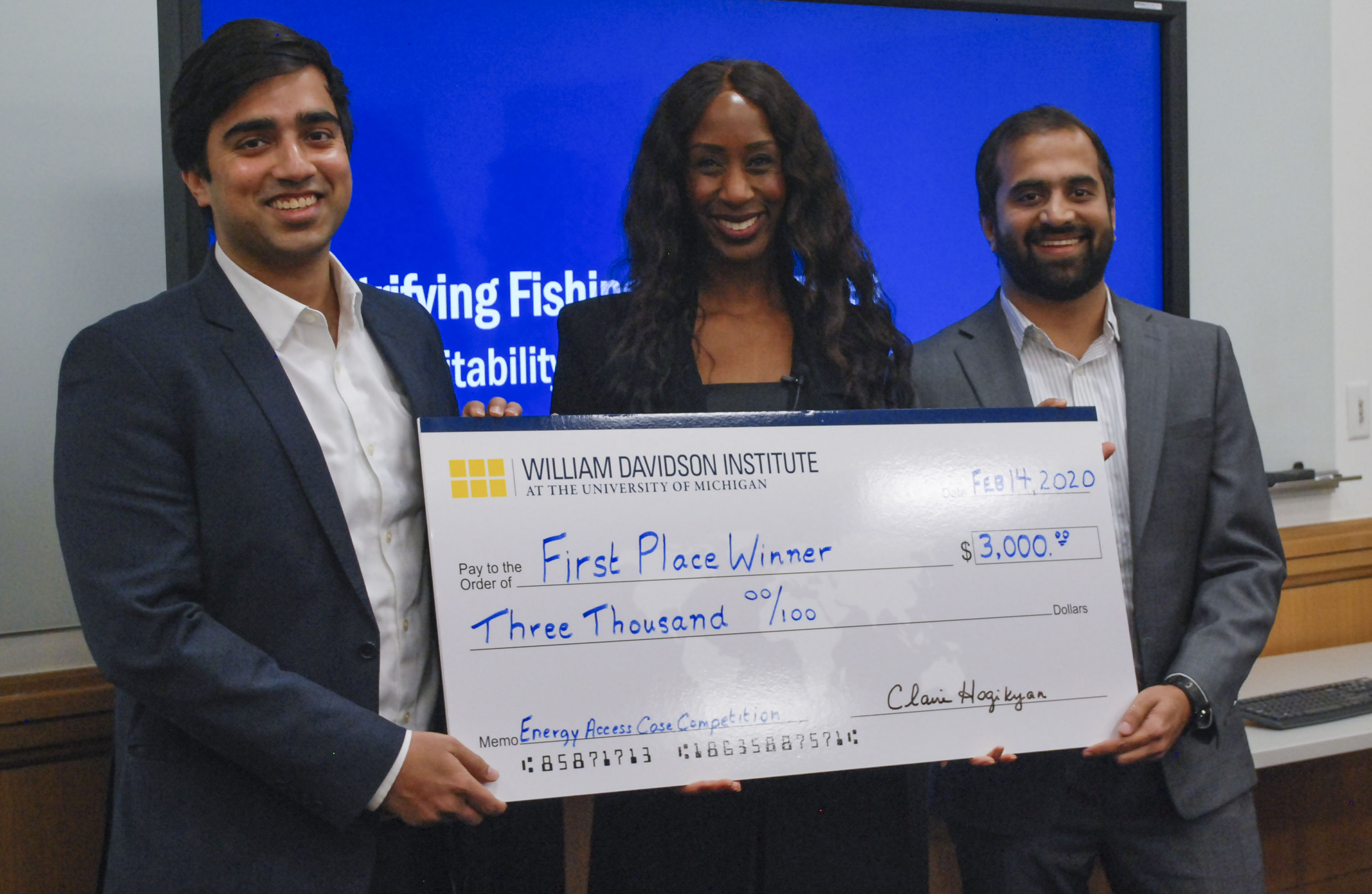
Maneel Grover and Avinav Sinha (pictured right and left, with Bakulumpagi-Wamala at center), both MBA students graduating in 2020 and both originally from Delhi, India, took first place. Their winning solution focused on equipping fishing boats with electric motors and helping to develop the businesses necessary to service those craft. The team made the case that electrification would ultimately save the local fishing industry money compared with using diesel.
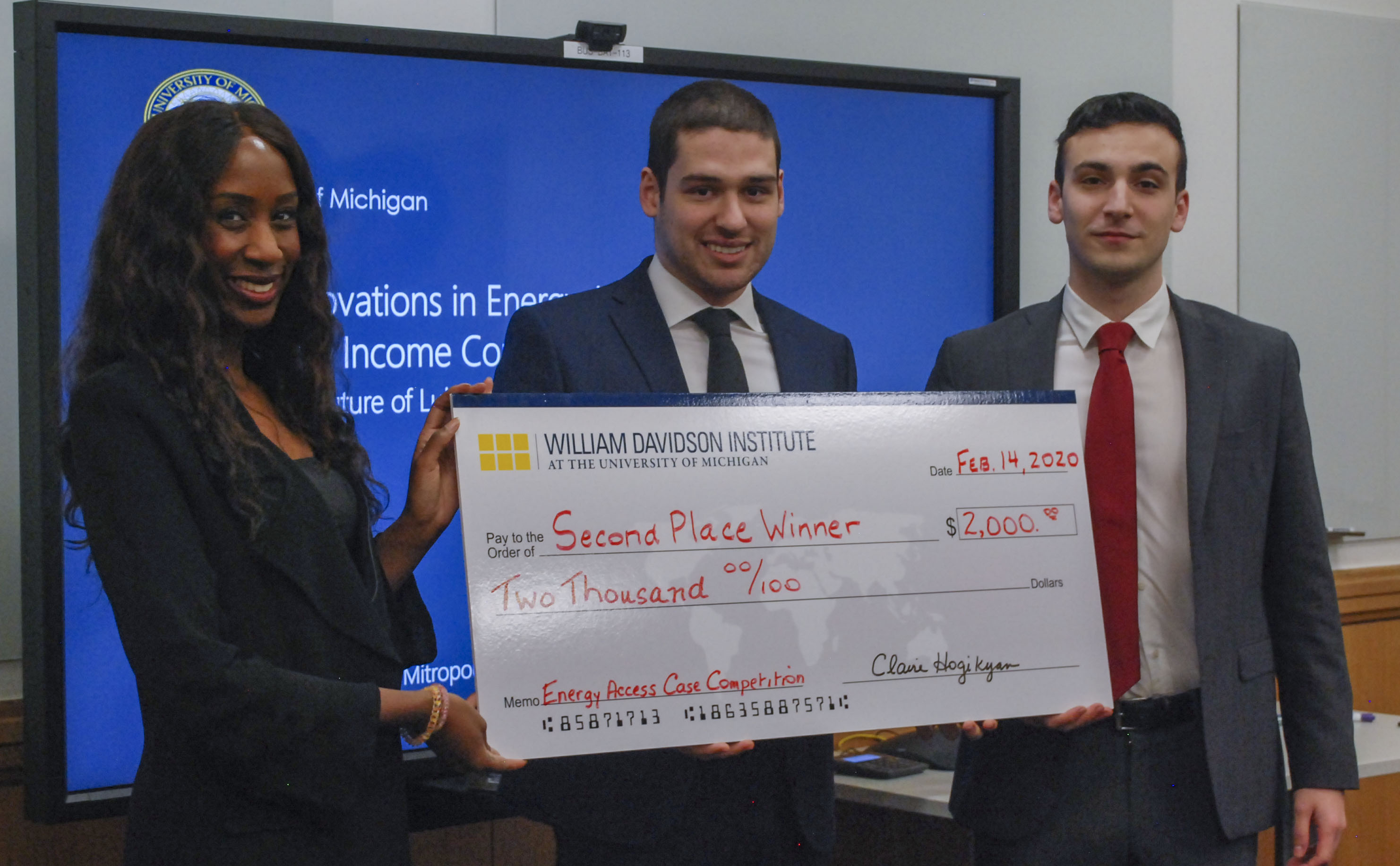
Coming in second place was the team of Gerasimos Dedes and S. Aris Mitropoulos, both majoring in engineering at U-M. The team presented ways to use energy to expand fish processing facilities and recycling discarded fish nets into other goods.
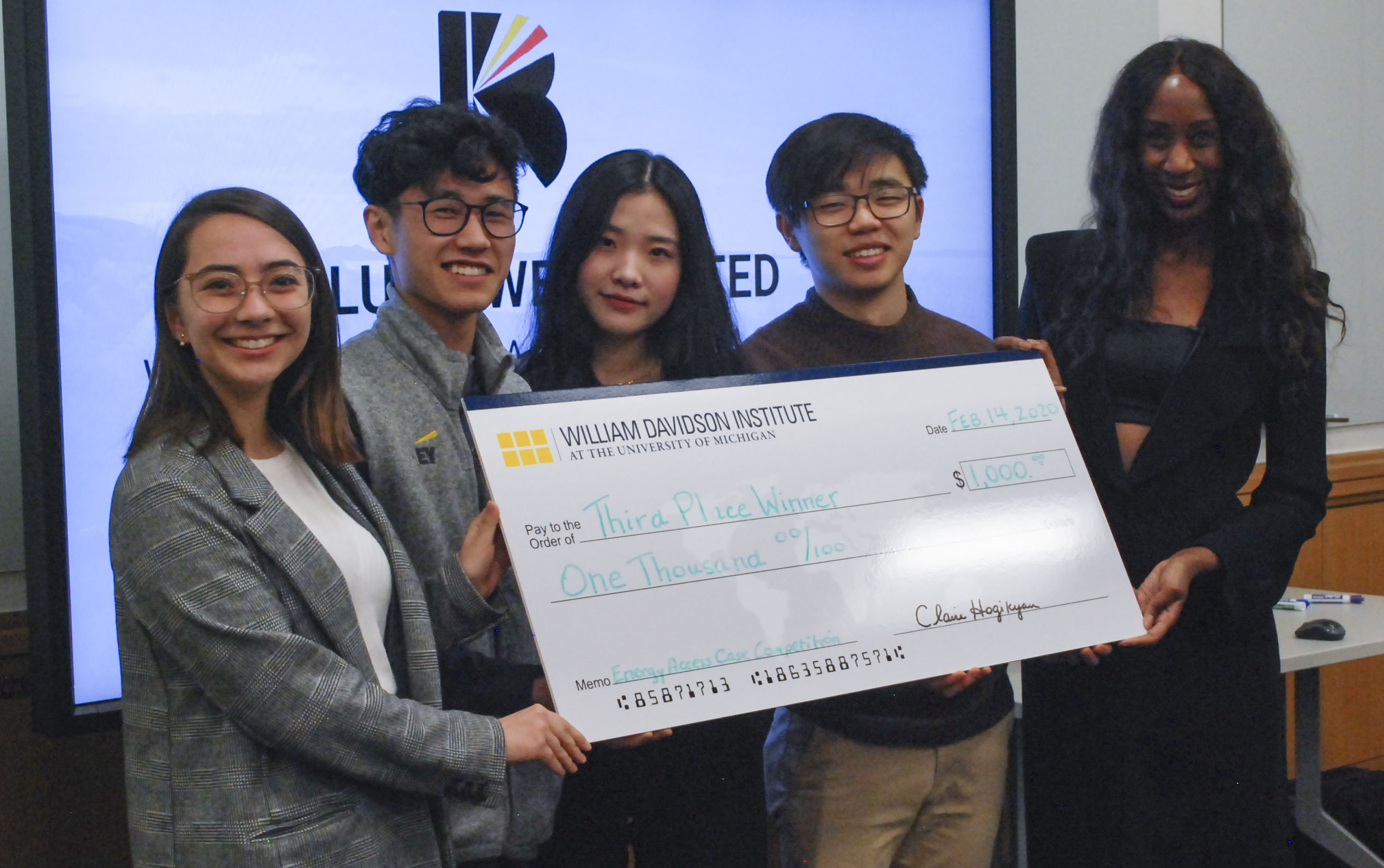
A team comprised Ashley Hwang, Haotian Jiang, Maya Malouin, and Brian Zhao – all undergraduate students, came in third place. All team members are pursuing Bachelor of Business Administration degrees. Their solution explored incentivizing electric cooking instead of the more commonly used charcoal, implementing water purification systems and developing new cold storage systems.
Bakulumpagi-Wamala said she was overwhelmed by the students’ questions, their presentations and the energy they brought to the competition.
“Twenty-four hours later, I cannot believe the level of detail in the research the students did and I think I actually learned more than they did,” she said. “This challenge has been incredibly timely, we still have time to make adjustments and deploy some of the ideas we heard.”
Bakulumpagi-Wamala said several of the ideas presented by the teams had previously been discussed by Bakulu Power’s management team. In fact, the winning team’s concept of electrifying boats had been introduced by one of her colleagues not long ago.
“Based on my experience with this 24-hour challenge, working with the students, the Michigan Ross faculty and the team at WDI, I would strongly recommend it to any business,” Bakulumpagi-Wamala said. “The more great minds you can bring to the table, the more solutions you can deploy.”
Clyde noted that the idea for hosting the competition came from one of this year’s Davidson Field Scholars, students who have conducted multiple projects with WDI.
“The student teams came from different schools across the university, representing a wide breadth of experiences and a depth of expertise – and they came up with a wide array of potential business models for this Ugandan business to try,” Clyde said.
Clyde also said WDI is interested in hosting similar competitions in the years to come.
“This competition drew upon the strengths of the Institute in a way that is clearly in line with our mission to equip decision makers with tools that will allow them to succeed commercially,” he said. “This event also provided a blueprint for future case competitions, in which we are able to engage students with some of WDI’s partner organizations in addressing their business challenges in a live setting.”
This primer provides a comprehensive but non-technical overview of the distinct health information systems (HIS) that all together support health care delivery in low-resource settings. It opens with a historical account and landscape assessment and describes the urgent need to build a lean rigorous HIS that integrates these different components. Subsequent sections describe the individual systems that: i) track individual patient and health care provider information; ii) directly document care delivery; iii) provide public and population health data; iv) support facilities’ and community health workers’ administrative and financial functions; and v) coordinate logistics and health commodities supply chains. A separate section describes imported data, including “master data” and manufactured (e.g., “meta”) data. The primer closes with recommendations for principled HIS stewardship.
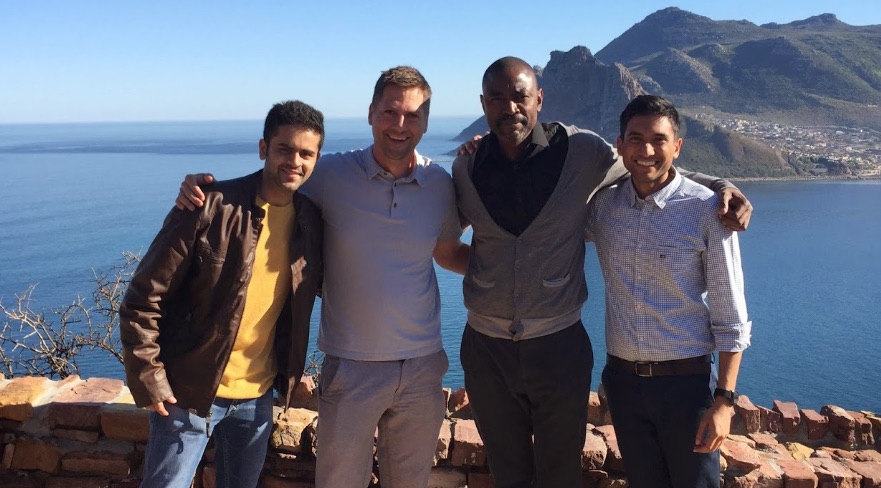
Puneet Goenka, far right, with his PATH colleagues in South Africa.
Note: This is one in an ongoing series of articles profiling past WDI interns and Multidisciplinary Action Project (MAP) team members and their career paths. Additional profiles in the series may be found here.
Puneet Goenka always wanted a career in which he could improve people’s lives.
As an undergrad at the University of Michigan, he studied cell biology with an eye on the medical profession. Then he heard a talk by Partners In Health Co-founder Dr. Paul Farmer who said even though life-saving drugs were readily available around the globe, it might take years to get them to those in need. Goenka said he realized just researching a life-saving drug wasn’t enough.
After graduation, he worked for a manufacturing company in Chicago on its health, safety and sustainability team. He later moved to India for a consulting job and then founded a start-up enterprise. Throughout all these career changes, Goenka became more determined to work in the development sector.

While I knew it would serve as a useful resource, I did not realize just how helpful the Institute would be until I got to Ross and started interacting with the staff and professors associated with WDI.
—Puneet Goenka, Senior Consultant FSG
He chose U-M’s Ross School of Business for his MBA studies in part because of WDI’s student-focused programs. One of those programs, the WDI Global Impact Internship program, would help Goenka “cement his commitment” to a life working in the development sector. And when he was looking at graduate schools, WDI’s programs struck him as a great resource for MBA students.
“While I knew it would serve as a useful resource, I did not realize just how helpful the Institute would be until I got to Ross and started interacting with the staff and professors associated with WDI,” he said.
While at Ross, Goenka said that an off-campus internship search—more typical in the development sector—was challenging at first, but connections and resources provided by WDI made things easier for him, especially the summer internships offered by WDI.
“…That itself was a huge help for someone who was navigating the development sector for the first time,” he said. “I remember having a hard time narrowing down exactly which internship projects I wanted to apply to because each one was exciting. Finally, I decided to apply to projects that would allow me to work in the healthcare space—something I had wanted to do growing up but never really got the chance to—in a country that I had no prior experience in.”
Goenka worked with the Seattle-based global health nonprofit PATH to develop a market entry strategy for a low-cost medical device in three countries—South Africa, Ghana and Uganda. For his internship, Goenka researched the regulatory environment, mapped the current landscape of comparable products, studied customer needs and usage patterns, estimated demand and recommended context-appropriate pricing.
Goenka said never having worked in those three countries and never with medical devices made him both “nervous and excited.” But he learned a lot, he said. He developed a financial model by himself for the first time: “a skillset that continues to be useful to this day.” He also learned how to navigate the different business cultures in each country.
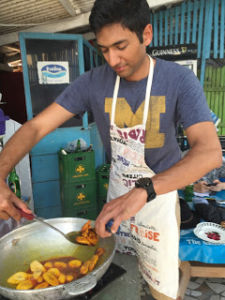
Goenka learning to cook Ghanian food.
For instance, Ghana’s business culture was “relationship-based,” where simply being polite and friendly opened doors to get interviews with relevant stakeholders at national hospitals. Uganda was more process-driven, he said, and required formal letters in order to meet with officials. Goenka would later be sent to Uganda for his current job and said his experience there as an intern gave him more confidence in conducting research this time around.
“The internship with PATH cemented my commitment to developing a full-time career in the development sector,” he said. “The work was challenging; I was working alongside driven and smart colleagues and the impact potential of the work was high. These were all important factors for me and I saw them coming alive while at PATH, which gave me confidence that I would enjoy working in the development sector.”
Goenka now leads case teams as a senior consultant for FSG in India. FSG is a consulting company that finds business solutions to social challenges. After working on an early education project for nearly two years, he is currently working on a project in Uganda to provide households with better sanitation facilities. But instead of just building and providing toilets for free, his project looks to stimulate the market so households can invest in and buy their own toilets, and the private sector is better equipped to provide customer-appropriate toilets.
“This work is a perfect way for me to blend my business training and experience with my interest in the development sector,” he said.
For now, Goenka is content working and living in India, but is open to moving elsewhere if the right opportunity came along.
“I’ve been fortunate to have worked in the U.S., India, and a little in South Africa, Ghana, and Uganda—thanks to PATH and WDI—and that makes me feel better equipped to work in new and unfamiliar geographies and contexts,” he said. “However, irrespective of geography and sector, I am quite sure that I will continue to work in the development sector, trying to improve people’s lives.”
This research project aimed to identify the factors influencing the performance of energy enterprises in emerging markets and provide a framework and methodology for documenting and assessing these models. Based on a literature review, the team of six School for Environment and Sustainability (SEAS) master’s students identified factors that relate to the technical, business, policy and socio-economic contexts that energy enterprises operate within. These factors were then used to develop an interview guide for expert interviews in India and Uganda. As part of the final report, the team compiled a repository of energy business models using these factors as a consistent assessment methodology.
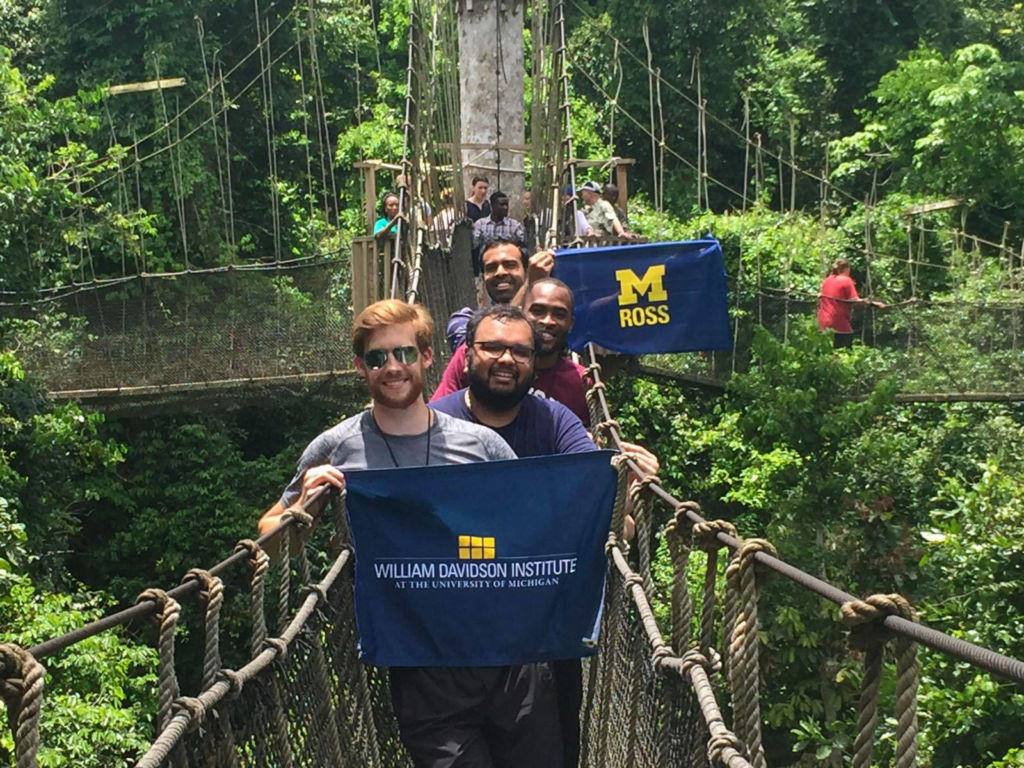
A 2018 WDI MAP team in Ghana.
Carrie Boyle, a MBA student at Michigan’s Ross School of Business, hopes to work in philanthropy somewhere in the U.S. after graduation. But for a couple of weeks in March, she is excited to be traveling to India as part of the school’s annual Multidisciplinary Action Projects (MAP).
“Working in another country is something I may never get the chance to do again,” she said. “This will be my first time in India and the country really interests me.”
Boyle and her teammates will work with Michigan Academy for the Development of Entrepreneurs (MADE), a nonprofit institute established at Ross by the Zell Lurie Institute for Entrepreneurial Studies, in partnership with WDI and Aparajitha Foundations. MADE works with entrepreneurship development organizations in India to help entrepreneurs operating small- and medium-sized enterprises (SMEs) succeed.
Boyle said she had some criteria when looking for MAPs that interested her.
“I wanted an opportunity to be on the ground having meaningful conversations with the people most immediately impacted by SMEs,” she said. “SMEs employ so many people and impact so many lives.”
Her teammate Shoko Wadano said she too is interested in working with SMEs, “which are very common in India.”
“I’m interested in how businesses mature in India,” she said. “I want to learn what pressures and impacts SMEs have in common, and what kind of value we can bring to them.”
WDI is sponsoring the MADE MAP project along with 10 others this year. MAP is an action-based learning course in which MBA students receive guidance from faculty advisors from WDI and Ross. Each project requires analytical rigor, critical thinking and teamwork. (Find out more about WDI’s MAP projects over the years here.)
After learning about their projects and conducting secondary research for several weeks, the student teams spend two to four weeks working with their organizations in the field.

David Butz
“The complementarities between the talents our students bring and what our sponsors need are sublime,” said David Butz, a WDI senior research fellow in the Healthcare sector who is an advisor on two projects. “Our students experience impact in brand new ways. Our sponsors learn, too, how disciplined management methods can yield dramatic innovations.”
Butz said he enjoys working with the student teams on MAP because it “poses such a unique challenge for both the students and their sponsor organizations, and forces us all to think big.”
“For me, the best achievements are tangible, direct and narrow but at the same time big and high-impact,” he said. “In our short time, can we help to break some key bottleneck, expedite a critical process pathway or otherwise liberate resources and expand capacity? Is the innovation scalable or replicable elsewhere? Do the students and organizations thereby feel empowered?”
Here is a summary of each WDI-sponsored MAP project:
Aravind Eye Care System – India
MAP Team: Rohan Dash, Sid Mahajan, Aman Rangan, Nik Royce
Aravind Eye Care System (AECS) is a vast network of hospitals, clinics, community outreach efforts, factories, and research and training institutes in south India that has treated more than 32 million patients and has performed 4 million surgeries since its 1976 founding.
AECS opened a tertiary eye care center in Chennai in September 2017 that will ultimately serve more patients than any other facility in the AECS system. The MAP team will formulate a detailed three-year strategic plan for Aravind Eye Hospital in Chennai.
CURE International, Inc. – Kenya, Ethiopia, Zambia, Uganda
MAP Team: Dominique James, Sarah Raney, Hannah Viertel, Olga Vilner Gor
CURE operates clubfoot clinics in 17 countries around the world, each tasked with helping children and families deal with the congenital deformity that twists the foot, making it difficult or impossible to walk.
For CURE, the student team will develop a strategic evaluation framework to assess opportunities for market entry and expansion building on global data.
Ghana Emergency Medicine Collaborative – Ghana
MAP Team: Benjamin Desmond, Benjamin Quam, Nicholas Springmann, Vishnu Suresh
The Ghana Emergency Medicine Collaborative aims to improve emergency medical care in Ghana through innovative and sustainable training programs for physician, nursing and medical students. The goal of the training programs is to increase the number of qualified emergency health care workers retained over time in areas where they are most needed.
The MBA team will formulate a detailed strategy to implement interoperable digital payment systems in Ghanian hospital emergency departments.
India Investment Fund – India
The India Investment Fund is working to become the first international, student-run fund at the Ross School of Business. Ross MBA students would be responsible for investing, managing and growing a real investment portfolio.
MAP Team: Charlie Manzoni, Patrick Riley, Queenie Shan, Sheetal Singh
The student team will conduct due diligence on Indian small- and medium-sized enterprises to assess viability for investments, and an appropriate financing instrument.
Infra Group – Ethiopia
MAP Team: Rin Chou, Chandler Greene, Yuki Ito, Brittany Minor
Infra Group is diversified international group with business units in financial services, industries and infrastructure development. Infra Group helps build a more prosperous society through global-scale business development with integrity as its top priority.
The MAP team will conduct due diligence on a group of small- and medium-sized enterprises (SMEs), and recommend which ones to invest in and what amount to invest.
Lviv Business School & Ukranian Catholic University – Ukraine
MAP Team: Blake Cao, Emily Fletcher, Kelsey Pace, Adam Sitts
Lviv Business School and Ukranian Catholic University is a private educational and research institution in western Ukraine.
The student team will undertake a needs assessment of the small- and medium-sized enterprises (SMEs) to determine if Lviv Business School should begin offering consulting services to these SMEs and if so, how those should be structured.
MADE – Poornatha/Aparajitha Foundations – India
MAP Team: Carrie Boyle, Lawrence Chen, Dillon Cory, Shoko Wadano
Michigan Academy for the Development of Entrepreneurs (MADE) is a nonprofit institute established at the Ross School of Business by the Zell Lurie Institute for Entrepreneurial Studies, in partnership with WDI and Aparajitha Foundations. MADE works with entrepreneurship development organizations in developing countries to give individuals operating businesses in these environments the knowledge and best practices they need to thrive.
The MAP team will develop an expansion plan for MADE in the southern Indian state of Tamil Nadu.
The Ihangane Project – Rwanda
MAP Team: Lauren Baum, Nadia Kapper, Paul Mancheski, Jason Yu
The Ihangane Project (TIP) empowers local communities to develop sustainable, effective, and patient-centered health care delivery systems that holistically respond to the needs of vulnerable populations. Partnering with Ruli District Hospital and its associated health centers, TIP is working to identify key strategies for improving health outcomes.
The student team will develop a business model to grow the ready-to-use therapeutic food that is used to treat severe, acute malnutrition.
WEEKEND MBA MAP PROJECTS
Awash Bank – Ethiopia
MAP Team: Matthew Campbell, Joshua Dodson, Joseph McCarty, Aman Suri
Awash Bank, a private, commercial bank, was established in 1995 and features more than 375 branches across the country.
The MAP team will develop a product that can provide capital to small- and medium-sized enterprises (SMEs) in Ethiopia by utilizing remittances already being sent back to that country. The students will work with the bank on all aspects of the loan product. They also will give the bank recommendations on how to monitor the loan and provide business support to SMEs that borrow from the fund.
Grace Care Center – Sri Lanka
MAP Team: Daniel Cady, Yizhou Jiang, Gerardo Martinez, Daniel Murray
The Grace Care Center (GCC) is a home to about 70 orphaned children that offers daycare services and vocational training. It also is home to several poor and displaced seniors, many of whom have chronic health issues such as hypertension and diabetes.
Past MAP student teams from the Ross School of Business developed a diabetic care center model for GCC. This year’s student team will examine the current model and make any needed updates and revisions.
International Clinical Labs – Ethiopia
MAP Team: Emily Mascarenas, Torre Palermino, Alexander Santini, Matthew Traitses
ICL was established in 2004 to provide quality laboratory service all over Ethiopia. ICL serves more than 240 health care centers throughout the country, and is expanding its service throughout Ethiopia.
The Ethiopian government is building its first medical waste incinerator facility outside the capital city of Addis Ababa and has committed to building seven more around the country. WDI is assisting a group of business managers with business plan advice who are interested in managing the business aspects of operating the incinerators. The MAP team will develop a proposal to be presented to the government later this year for the business managers to operate the incinerators.
WDI’s research project aims to identify the factors influencing the performance of energy enterprises in emerging markets, and provide a framework and methodology for documenting and assessing these models. The team will identify factors that relate to the technical, business, policy and socio-economic contexts that energy enterprises operate within, and compile an initial repository of energy business models using these factors as an analysis methodology. It also will look at energy enterprises in Uganda, India and Cuba leveraging existing relationships across both WDI and the Erb Institute.